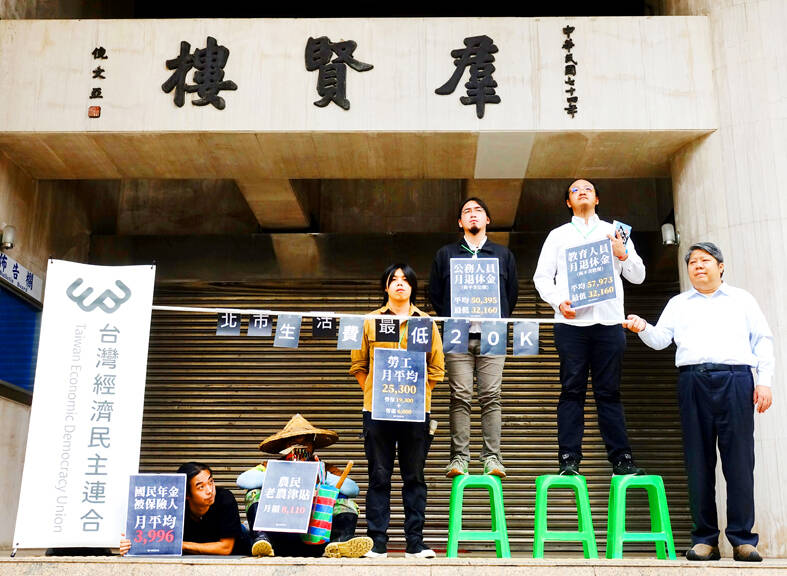-
By Lin Che-yuan
and Jason Pan /
Staff reporters
The push by the Chinese Nationalist Party (KMT) to suspend pension reforms amounts to “robbing the poor to give to the rich,” resulting in wider income gaps, and injustice against farmers and laborers, the Economic Democracy Union (EDU) said.
EDU members protested outside the legislature yesterday, a day after the bill to suspend pension reforms passed its first reading with backing from the Taiwan People’s Party.
The bill would roll back reforms to the pension system launched by the Democratic Progressive Party government in 2017, which was aimed at securing solvency for the state pension fund, as the previous pension scheme allowed civil servants, military personnel and teachers to “contribute little, retire early and receive generous benefits” at the expense of other workers and farmers, the activist group said.

Photo: Tien Yu-hua, Taipei Times
EDU researcher Huang Ting-wei (黃亭偉) said that retired public school teachers receive an average monthly pension of NT$57,973, while civil servants get a monthly average of NT$50,395.
The government defines the lowest standard of living expenses this year as requiring NT$20,379 per month in Taipei and NT$15,515 elsewhere, with incomes below these figures considered to be low-income households, Huang said.
“Civil servants and teachers — retired and not working — are getting more than NT$50,000 from their pensions, above the average salary, yet the pensioners claim to be poor and to have difficulty living, and so they fight pension reform,” he said.
“Taiwan’s more than 500,000 farmers receive only a monthly average of NT$8,110 in retirement benefits,” Huang added.
“More than 1.9 million working class retirees receive an average of NT$25,300 in retirement benefits. Of these, more than 180,000 retired workers are getting by on a monthly pension of less than NT$10,000,” he said.
Huang said that at the end of last year, Taiwan had 4.48 million people over the age of 65, with about half of them receiving less than NT$8,000 in retirement benefits.
“This NT$8,000 is far below the NT$50,000 received by retired civil servants,” Huang added.
The legislature should amend the Act Governing the Allocation of Government Revenues and Expenditures (財政收支劃分法) to guarantee a minimum monthly retirement benefit of NT$8,000 for all citizens without regard to occupation, the EDU said.